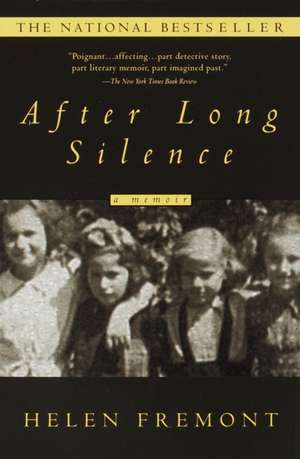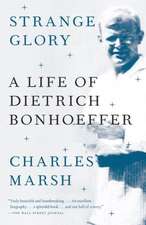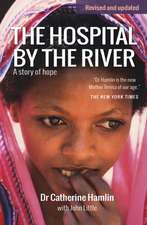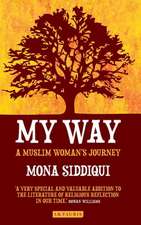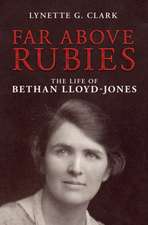After Long Silence: A Memoir
Autor Helen Fremonten Limba Engleză Paperback – 31 dec 1999
Helen Fremont was raised as a Roman Catholic. It wasn't until she was an adult, practicing law in Boston, that she discovered her parents were Jewish--Holocaust survivors living invented lives. Not even their names were their own. In this powerful memoir, Helen Fremont delves into the secrets that held her family in a bond of silence for more than four decades, recounting with heartbreaking clarity a remarkable tale of survival, as vivid as fiction but with the resonance of truth.
Driven to uncover their roots, Fremont and her sister pieced together an astonishing story: of Siberian Gulags and Italian royalty, of concentration camps and buried lives. After Long Silence is about the devastating price of hiding the truth; about families; about the steps we take, foolish or wise, to protect ourselves and our loved ones. No one who reads this book can be unmoved, or fail to understand the seductive, damaging power of secrets.
What Fremont and her sister discover is an astonishing story: one of Siberian gulags and Italian royalty, of concentration camps and buried lives. AFTER LONG SILENCE is about the devastating price of hiding the truth; about families; about the steps we take, foolish or wise, to protect ourselves and our loved ones. No one who reads this book can be unmoved, or fail to understand the seductive, damaging power of secrets. -->
Preț: 120.26 lei
Nou
23.02€ • 25.01$ • 19.35£
Carte disponibilă
Livrare economică 31 martie-14 aprilie
Specificații
ISBN-10: 0385333706
Pagini: 368
Dimensiuni: 134 x 205 x 25 mm
Greutate: 0.31 kg
Editura: DELTA
Notă biografică
Extras
My sister and I knew that our parents were from a distant and dangerous world, that they had come out of a war, and that no one else had come with them. Although we could not hear their accents, our playmates told us our parents spoke funny English; and when our schoolmates asked about our grandparents and aunts and uncles, we said we didn't have any. Except, of course, our auntie Zosia, who lived across the ocean in a place called Italy.
I also knew that my parents had been in concentration camps. I misunderstood the meaning of concentration and assumed that in prison, the inmates were consumed by intensely focused mental activity. I believed that these camps were so deadly that they had sewn my parents into pockets of complete silence. And so I understood that two things could happen to you in a war: either you were suddenly, breathlessly, swept off the streets by a bomb, or you were scooped into a concentration camp, where you swallowed a terrible silence.
My mother, I knew, was finally sprung from the camp by her sister, Zosia, who baked goodies and buttered up the camp warden. My father had it worse--he was off on a sheet of ice somewhere in Siberia for six years, until he escaped. I never knew how he escaped, except that he had managed to jump a train and hang on for days. I pictured him dangling from his one good arm, long, tattered legs swinging an arc each time the train banked a curve.
Their love story I had been fed early and often, until it seemed part of my bones. I knew that they had fallen in love before the war, and they had been separated for six years without knowing if the other was alive; my mother escaped Poland dressed as an Italian soldier, and my father walked across Europe after the war, found my mother in Rome, and married her ten years to the day after they had first met. This was the tale they liked to tell and retell, the story they used to summarize their lives. It was a good story, because it ran a thread across the war and connected the two lovers before and after. It tied a knot in their tongues at the end, and the war remained silent; the intervening six years could never be spoken.
My father, Kovik Buchman, was a self-employed family doctor with a sharp Slavic accent, pure white hair, and a chip on his shoulder the size of a Soviet tank. He was forty-two when I was born, twice as old and almost twice as tall as other daddies. He built a little office downtown, having drawn up the blueprints and supervised the construction himself. He bought all the latest equipment, an X-ray machine and elaborate instruments, lab equipment and simple furniture. His office was dark and smelled of medicine, with floor-to-ceiling bookcases, textbooks, and illustrated medical periodicals. My mother sewed the curtains--bold op-art designs without a trace of heritage.
His patients poured in, Poles and Lithuanians, Czechs and Hungarians. They liked bantering with him in their home tongues, liked his European approach, his punctuality, his efficiency, his dry sense of humor. He worked from early morning until late at night, six days a week. He made house calls on a moment's notice, day or night. You could almost hear him click his heels as he marched from one patient to another. His stride was enormous, his smile brief, his gaze intense. "Sit," he would command, slapping on a blood-pressure band. "Inhale deeply." "Cough." "Say 'Aaah.'" His exam was quick and thorough. "All set," he would snap. "You may dress. Call me tomorrow." In a flash he would be down the hall, ushering the next patient into his other examining room.
My mother was a more slippery figure. Slender and supple, she was half my father's size and twice as elusive. She spent the day at home up to her elbows in yellow Playtex living gloves, cleaning house. She smelled of ammonia and lemons. "Be a doctor," my mother always instructed us. "Don't marry one."
In the fall she tied her hair in an aqua-green surgeon's cap and began rearranging nature, brandishing a rake that was taller than she was. She stuffed leaves into barrels, dragged them from one end of the property to the other, and dumped them over the cliff behind our house. In the spring she planted an elaborate rock garden under the white pines, using rocks she had kidnapped from nearby streams. Kneeling in dirt for hours, she separated and reunited plants from the woods and the rock garden, until it was hard to tell where her garden ended and the woods began.
Our house itself was a crazy-shaped glass-and-brick affair surrounded by a small forest--a swank fifties Frank Lloyd Wright knockoff. My parents had fallen in love with it instantly because it looked like nothing they'd ever seen before. We moved in just after I was born, after they'd changed their name to Bocard and settled into their new American identity.
It was a loud house. The sun danced through the pines and smashed through our floor-to-ceiling windows. An overbearing sky trumpeted each new day and tossed us out of bed. From the living room, violins wept on the hi-fidelity. A fat medical text lay open on my father's lap, the Sunday Tribune spread at his feet. The dog a respectful distance away, banished from the Oriental rug.
Kazakhstan followed my father to the new world in the form of floor covering. He wiped his feet on Middle Asia. Solzhenitsyn lined his bookshelves. The First Circle, Cancer Ward, One Day in the Life of Ivan Denisovich. The Rise and Fall of the Third Reich by William Shirer. The Gathering Storm, volume after volume after volume, by Churchill. Books soared for the ceiling: The Art of Florence, The Operas of Puccini, The Roman Ruins. Dictionaries in every color and language. Volumes of German grammar, Duden.
From the moment my mother moved to the States, she and her sister, Zosia, wrote each other three or four times a week. Pale blue aerograms with every millimeter of available space filled in elite type, with handwritten notes squeezed into the margins. The Italian post was terrible, and my mother would go days without mail and then get a bonanza of letters. Sometimes the letters arrived in little plastic bags, charred, torn, and taped back together.
They wrote of the same things day after day: the weather, their bridge games, the children, books, movies, opera--or so my mother claimed whenever I asked her to translate the letters. From the excerpts she read to me, I couldn't fathom why my mother's face lit up every time she found a letter from my aunt in the mailbox. "Zosia!" she would exclaim, and race up the driveway to make herself a celebratory cup of pale tea with lemon. Then she gently pried open the aerogram with a knife, careful not to lose any words clinging to the inside edge of the folds, and settled into the chaise longue in her bedroom to read.
When I was small, maybe five or six, my mother came to my bed every night to tuck me in. She would teach me the sign of the cross in six languages: Polish, Russian, German, Italian, French, and English. Each night I selected a language, and we said the sign of the cross in that language: In the name of the Father, the Son, and the Holy Spirit, Amen. Then she taught me the prayer Our Father in these languages, and I rehearsed them until I knew them by heart. I loved the way gumdrop syllables rolled off the tongue in Italian and the way consonants crashed in German; I loved the tongue-twisting sounds of Polish and the fur-lined purr of French and Russian. And of course, I loved our conspiracy--my mother's and mine. It was our time alone, our time together, and she was sending me into a night of sleep, protected by a God who could respond to me in any language, under any sky.
What I didn't understand was that my mother was equipping me with the means of survival: proof of my Catholicism to anyone in a dozen countries.
Recenzii
--The New York Times
"An extraordinary tale...eloquently written....Its complex narrative weaves back and forth between past and present, the tale and its discovery."
--The Philadelphia Inquirer
"Fascinating...A tragic saga, but at the same time it often reads like a thriller filled with acts of extraordinary courage, descriptions of dangerous journeys and a series of secret identities."
--Chicago Tribune
"Riveting...painfully authentic...a poignant memoir, a labor of love for the parents she never really knew."
--The Boston Globe
"Mesmerizing...Fremont has accomplished something that seems close to impossible: She has made a fresh and worthy contribution to the vast literature of the Holocaust."
--The Washington Post Book World
Textul de pe ultima copertă
Helen Fremont was raised as a Roman Catholic. It wasn't until she was an adult, practicing law in Boston, that she discovered her parents were Jewish -- Holocaust survivors living invented lives. Not even their names were their own. In this powerful memoir, Helen Fremont delves into the secrets that held her family in a bond of silence for more than four decades, recounting with heartbreaking clarity a remarkable tale of survival, as vivid as fiction but with the resonance of truth.
Driven to uncover their roots, Fremont and her sister pieced together an astonishing story: of Siberian Gulags and Italian royalty, of concentration camps and buried lives. After Long Silence is about the devastating price of hiding the truth; about families; about the steps we take, foolish or wise, to protect ourselves and our loved ones. No one who reads this book can be unmoved, or fail to understand the seductive, damaging power of secrets.
